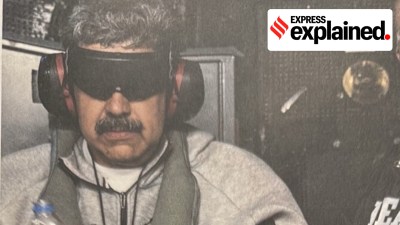A case for Veerappan8217;s detenus
The ongoing battle in the Supreme Court over the move to release Veerappan's quot;associatesquot; has thrown up two legal issues of grea...

The ongoing battle in the Supreme Court over the move to release Veerappan8217;s quot;associatesquot; has thrown up two legal issues of great consequence. One is, of course, the question whether the rule of law should be submitted to anybody8217;s blackmail. The notorious examples of the Kandahar hijacking and Rubaiya Sayeed kidnapping suggest that this is a recurring problem which needs to be addressed in terms of a larger policy against terrorism. Compromised as it is, the executive has so far not shown the required vision or courage to formulate such a policy. It is therefore just as well that this rather tough question has now been referred to the Supreme Court for the first time in the context of Veerappan8217;s demand to swap 51 TADA detenus for his hostage Rajkumar. Regardless of the outcome of the current drama, the Supreme Court will hopefully lay down a legally binding pronouncement on the subject after considering all the viewpoints.
For all its indignation last week at the Karnataka government8217;s surrender to Veerappan8217;s quot;illegalquot; demand, the Supreme Court has overlooked a conflicting but equally important issue raised by the case. Namely, the probability of those 51 detenus, labelled as Veerappan8217;s associates, being actually long suffering victims of the much abused TADA. There is an implied admission to that effect in the stand taken by the Karnataka government for seeking to withdraw the TADA charges against them. The government has, of course, made that admission because of Rajkumar8217;s kidnapping and not due to any change of heart. But what is little known is that the government8217;s admission actually confirms the allegations being made by human rights activists since 1997 about the abuse of TADA against those very 51 detenus.
There was already a serious campaign in Karnataka for their release long before Veerappan laid his hands on Rajkumar. The campaign prompted the National Human Rights Commission NHRC to send a committee last year to inquire into the state government8217;s alleged excesses while rounding up villagers in the cases against Veerappan. The committee8217;s proceedings were derailed as recently as in March 2000 by a stay order obtained by the Karnataka government. In a tragi-comic turn of events, barely five months later the same state government is seeking their release following Rajkumar8217;s kidnapping.
Given this background, it is evident that the situation warrants more than just the knee-jerk reaction displayed by the Supreme Court, that the proposal to release the detenus in the circumstances would undermine the rule of law. In all fairness, it should be borne in mind that, contrary to the popular perception, the Karnataka government is not seeking to drop the prosecution altogether in the cases against Veerappan and those 51 detenus. It is only trying to withdraw the TADA charges, which were routinely tagged those days in innumerable cases around the country just to ensure that the accused were not released on bail.
Somebody may well argue that the application of TADA to the Veerappan cases might however have been justified on the ground that many of his demonic actions fitted the definition of terrorist acts. But the fact of the matter is that TADA was allowed to lapse in 1995 because of the outrage around the country against its extensive abuse. So, if the TADA charges are withdrawn at this stage from the Veerappan cases, all those detenus and the other accused persons would still continue to be tried for offences under ordinary criminal laws, namely, the Indian Penal Code, Arms Act and Explosive Substances Act. Whoever among them is found to be guilty may still be convicted for grave offences such as murder, poaching, smuggling and kidnapping.
One immediate difference the proposed withdrawal of TADA will certainly make to the detenus is that they will become eligible to be released on bail. Their release will in turn involve the risk of those people fleeing from justice and not attending the trial. But then the courts weigh that risk inherent in all bail cases with factors that go in favour of the accused persons. Thanks to Rajkumar8217;s kidnapping, the Karnataka government has now been talking the language of the human rights activists it opposed earlier.
The government has finally acknowledged that the detenus have been languishing in jail for years, that they were farm labourers living in remote villages, that they have no criminal antecedents, that some of them are women and some are over 70, and that some have not been identified by any of the witnesses. The government also admitted that the worst that could be alleged was that some of the detenus had supplied food to Veerappan8217;s gang, informed them about police movements and were even found in possession of illegal arms. The picture that emerges from these details is not quite of the dreaded brigands associated with Veerappan. The timing is bad but the proposal to release them on bail, far from subverting the rule of law, may well uphold the human rights of the poor.
Bangalore is now talking the language of human rights activists it earlier opposed
- 01
- 02
- 03
- 04
- 05































